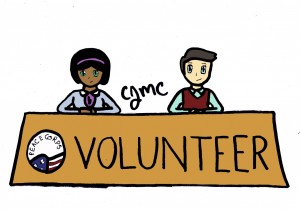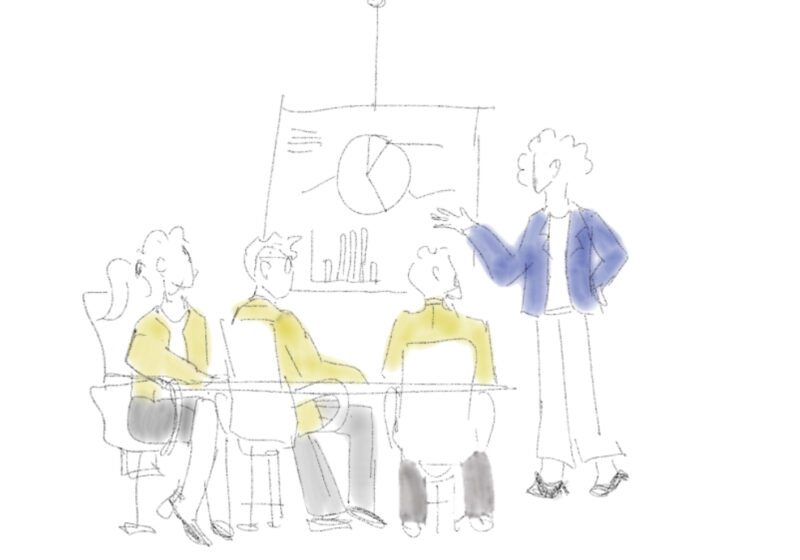As the first semester draws to a close and seniors begin to prepare for graduation, many students look toward the future with plans for medical, law, or business school. But for others, a slightly different post-graduation route calls them to action: service.
Despite not being a traditional choice for recent grads, the field of service work provides a wealth of opportunities. Although personal reasons for pursuing one of these options vary, there are a few common denominators among interested students.
“Many students look for ways to give back following their graduation, while also gaining professional experience,” Associate Director of the Gwen M. Greene Career and Internship Center Amber Graham said. Students are often driven to apply to service organizations because “they’re a great way to get started in education, nonprofit work, healthcare, and many other fields.” These routes are also a way for students to pursue a passion in a field requiring less time commitment at a lower intensity.
The application process is very strict and each organization has its own timeline.
“Teach for America has application deadlines throughout the year, starting as early as August,” she said, while “AmeriCorps usually has later deadlines, depending on the program.” Students applying to Peace Corps are able to take advantage of a “recently streamlined application process,” which now includes the ability to list country and role preferences.
Peace Corps is an international service initiative that deploys American citizens in foreign nations to solve major issues and help persons in need. Its mission is not only to aid in development, but also to promote cultural awareness between members and recipients, according to the organization’s website. It allows volunteers to gain valuable hands-on experience in real-world problem solving, all while benefitting culturally.
Looking stateside, both AmeriCorps and Teach for America are popular options for recent Rochester grads. Similar to its international counterpart, AmeriCorps works with its members to build communities within the U.S. The organization focuses on serving through several lenses, notably schools, organizations, and public institutions. The issues AmeriCorps tackles are relative to each community but almost always involve promoting development, whether educational, social, or economic. Through its programs, people can delve into experiential learning and emerge with a valuable skill set, not to mention modest earnings and educational awards.
UR grad and Tutoring and Access Assistant for the Center for Excellence in Teaching and Learning Sarah Gerin knows full well the impact AmeriCorps can have on those with whom it works.
She was a teacher in the program. “I was initially drawn to AmeriCorps because of its commitment to celebrating and strengthening community, and my belief that even small acts of service can foster larger, lasting change,” she explained.
After being inspired to get involved, Gerin was placed in Monroe Community College’s Upward Bound Program, working as an Academic Advisor. “In my position, I wore a lot of hats, so to speak: motivator, tutor, “cheerleader,” confidant, and sometimes [the students’] worst nightmare,’” she said.
It was these students to whom she devoted her time “to challenge, to teach, to support, to guide, and to listen.” But, as she put it, “nothing I did was one-sided.”
“I had something to learn and gain from my students just as they had something to learn from me,” she said. “Being the person that says ‘yes you can’ when all you hear is
‘I can’t’ was the most rewarding – albeit challenging – part of my job, even when the impact wasn’t always immediate.”
Gerin consideres joining AmeriCorps one of the best decisions she could have made, allowing her to develop her leadership, communication, and education skills.
For students interested exclusively in education, Teach for America (TFA) is extremely enticing. Dedicated to combating the issue of educational inequity in American communities, TFA provides applicants with the opportunity to teach underprivileged children for a two-year service period. The program aims to eradicate the divide between low- and high-income families in regards to their children’s access to quality education. TFA brings together a diverse pool of applicants, trains them, and sets them up in the areas that need them the most – those with poor educational opportunities to be mended – hoping to be the catalyst for a sweeping new movement.
Rochester grads can also choose to contribute specifically to the Rochester community through the Rochester Youth Year (RYY), an AmeriCorps VISA program. Organized by the Rochester Regional Network, RYY assigns recent grads to local community organizations for a year of service.
The objective of this service year is to find viable solutions for Rochester’s most challenging issues, namely poverty. RYY works to create and implement “measurable, sustainable services and programs that address the self-identified needs of Rochester’s youth,” as the group’s mission states.
College Prep Center Coordinator and Academic Advisor for Pre-College Programs through the Kearn Center Kyvaughn Henry did just that in her time as an RYY Fellow.
Browsing through employment opportunities after graduating from UR in 2009, she hadn’t set out to join RYY. But, as if by destiny, the program found her, she said.
Henry was placed at Writers and Books, “a nonprofit in Rochester that focuses on encouraging people of all ages to become lifelong readers and writers.”
Her role in the organization was to improve enrollment rates of low-income students involved in the summer programs – weeklong writing camps for children of all ages.
“Not a lot of people of color were attending their summer programs for the simple reason that it was unaffordable,” Henry said. Her task was then to find funds to help these disadvantaged kids attend Writers and Books’ summer camps. After working with her colleagues in grant writing and solicitation, the money was secured.
Through RYY, Henry also created an apprenticeship program. “I wanted to start an apprenticeship so that high school kids who knew they wanted to be teachers could get a firsthand look and feel as to what that [entailed],” she said.
Five years later, the opportunities she helped create are still there. “They still have scholarship programs, they still have these partnerships,” she said. “I was really proud of that…I felt like that was my baby,” she continued, describing the experience as “a big moment.”
Henry’s experience makes the case that even if they might not be appealing at first glance, service options could be worth checking out after graduation.
“[I realized] that I was here for a reason, and I wouldn’t have rather been anyplace else,” Henry said.
Trombly is a member of the class of 2018.






